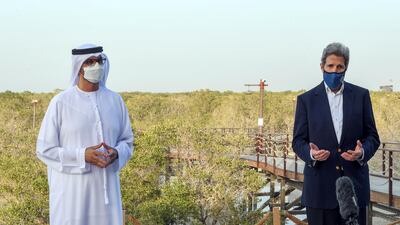Progressive climate action is not only a necessity but also a "powerful economic driver", said the UAE's special envoy for climate change, who called for greater investment in advancing the sector.
"If we do it right, it can actually put the world on a new low-carbon, high-growth, development trajectory," climate envoy Dr Sultan Al Jaber, who is also the UAE's Minister of Industry and Advanced Technology and managing director and group chief executive of Abu Dhabi National Oil Company, said.
The climate challenge needs to be seen as "an opportunity", Dr Al Jaber said during an online interview with Frederick Kempe, president and chief executive of Washington DC-based think tank, the Atlantic Council.
Movement restrictions put in place to stem the spread of Covid-19 led to a fall in carbon emissions in 2020, highlighting the potential for countries and energy-intensive companies to adopt measures that could continue to lower their carbon footprint.
Adnoc, which sells crude oil on behalf of Abu Dhabi, plans to lower its carbon footprint and reduce its emissions by 25 per cent over the next decade. Moreover, the commercial case for renewable energy "has never been stronger", Dr Al Jaber said.
In spite of the pandemic, the world added renewable energy capacity of 260 gigawatts last year, representing $300 billion worth of investments, he said.
"And this is something we should all be optimistic about, and we should very much build on."
On Friday, the UAE and the US underlined their joint commitment to take robust action on climate change before a crucial summit in Washington.
Both countries agreed to raise ambitions in tackling the issue following the Regional Climate Dialogue in Abu Dhabi earlier this month.
Dr Al Jaber, who met US climate envoy John Kerry during his visit, also spoke to energy secretary Jennifer Granholm ahead of a Leaders Summit organised by the White House.
The summit, which will be held on Thursday and Friday, will feature 40 world leaders discussing the climate challenge.
The US, which rejoined the Paris Agreement on January 27, is looking to re-establish a role as a leader in tackling global warming.
"This kind of relationship, dialogue and this type of climate diplomacy, delivering tangible outcomes, really reinforces our real deep strategic partnership with the US," Dr Al Jaber told Mr Kempe.
There are significant synergies to be generated through partnership with the "world's largest hydrocarbons producer and the world's largest economy", he added.
The UAE's climate envoy also stressed the country's efforts at producing a new generation of low-carbon fuels.
Earlier this year, Adnoc, along with other major state-backed entities Mubadala and ADQ, formed an alliance to produce hydrogen.
Adnoc will focus on increasing output of blue hydrogen, which is derived from natural gas through steam methane reforming, while the other partners will look to produce the fuel from renewable sources.
"So, we are identifying viable international market opportunities and developing a roadmap to create a hydrogen ecosystem, not to serve only the UAE market, but to actually cater for the global market," Dr Al Jaber said.
He also issued an "open invitation" to Adnoc's partners to help generate competitive hydrocarbons with "the least carbon emissions".


